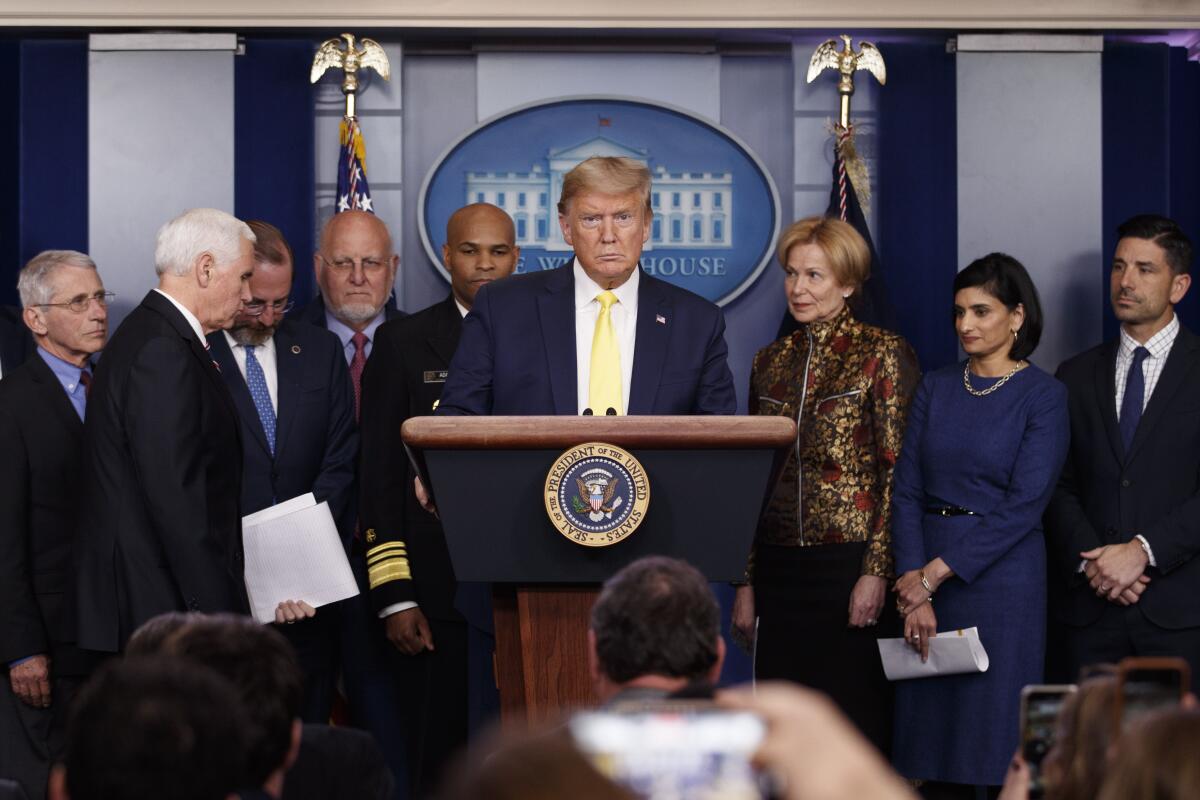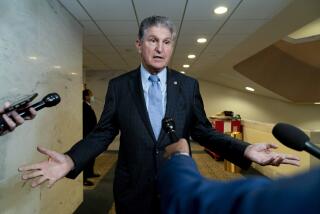Congress skeptical of Trump’s payroll tax cut to address coronavirus as first bipartisan talks begin

WASHINGTON — One of President Trump’s key proposals to confront the economic fallout of the novel coronavirus — a payroll tax cut — got mixed reviews from Senate Republicans on Tuesday during a Capitol Hill strategy-planning lunch that ended without agreement on the details of a possible stimulus plan.
But in the first sign of bipartisan cooperation to address the growing health crisis, Treasury Secretary Steven T. Mnuchin was dispatched to begin negotiating an economic package with House Speaker Nancy Pelosi (D-San Francisco).
The pairing of Mnuchin and Pelosi (D-San Francisco) on a coronavirus bill comes as Republicans and Democrats are at loggerheads on an economic response. In addition to the payroll tax cut, the White House supports tax relief for the travel and tourism industries.
But Democrats balked at tax cuts without financial support for sick or quarantined workers who may miss paychecks or currently receive no sick pay.
Even some Republicans are skeptical about whether a payroll tax cut is the best approach right now, according to Sen. Lindsey Graham (R-S.C.) and other senators. The White House floated a payroll tax “holiday” — designed to boost the paychecks of workers —that could be valued at more than $300 billion, according to one Republican senator in the room.
“At this point I am not ruling anything out. But obviously whatever we do, there has to be a really good rationale for it,” said Sen. John Thune of South Dakota, the Republican whip.
At the lunch, senators said Trump — joined by Mnuchin and economic advisor Larry Kudlow — said the meeting was more about discussing options than about laying out a specific stimulus plan.
“We talked in general about the tools in our arsenal. If the administration has decided on the specific tools, they didn’t share that with us. That is not a criticism. This was to allow us to have the input,” said Sen. John Kennedy (R-La.).
Though Trump said Monday he would unveil “major” economic stimulus proposals on Tuesday, no specific plan was released. Kudlow said only that the president wanted a “temporary payroll tax cut holiday, which I think he would prefer to last until the end of the year.” Kudlow gave no details about how large a cut it would be or how much it would cost.
The new bipartisan negotiating team is a reunion or sorts for Pelosi and Mnuchin, who is one of the only Trump administration officials who has successfully negotiated with the Democratic House.
Pelosi and Mnuchin worked well together last year to enact a budget deal. During the process of crafting that bill — which raised caps on spending and lifted the federal debt ceiling — Pelosi and Mnuchin built a mutual trust and respect. Mnuchin is a relatively apolitical member of Trump’s Cabinet with a laser-like focus on the economy. Pelosi is a longtime legislator well practiced in crafting political deals.
The talks mark the start of a what is likely to be a massive piece of legislation to approve billions of dollars to stimulate the economy and help American workers impacted by self-quarantines and school or work closures in the coming months.
“Everybody ought to understand this is going to cost us billions and billions of dollars,” Sen. Richard M. Burr (R-N.C.) said.
Mnuchin has been given “ball control” for the administration on the issue, Senate Majority Leader Mitch McConnell (R-Ky.) told reporters on Tuesday, putting Senate Republicans’ seal of approval on Mnuchin-Pelosi negotiations as well.
“We are hoping he and the speaker can pull this together so that we end up not playing partisan games at a time which seems to me to cry out for bipartisan and bicameral agreement,” McConnell said. During last year’s Pelosi-Mnuchin budget talks, McConnell similarly had the Senate stay out of the process, leaving the deal-making up to the White House and House Democrats and ultimately supporting the final product.
A stimulus package is not expected to move quickly. House Democrats plan to set up procedures to allow legislation to be fast-tracked ahead of a scheduled congressional recess next week. Pelosi has not committed to a timeline, and passage by the end of the week appears unlikely. It’s possible the House passes a bill of its own economic relief measures before the bipartisan negotiations finish.
“I don’t know that we can be ready this week, but we can introduce this week. We can introduce it and we may be ready this week,” Pelosi said, citing the need to get the legislation written and analyzed for cost.
Pelosi told reporters Tuesday that her first meeting with Mnuchin, lasting about 30 minutes, focused on “where our common ground was as to how we go forward.”
She acknowledged that the bill would have to include administration priorities, but said it would also need to address Democratic concerns, such as paid sick leave and access to clean water in all parts of the country so that people can wash their hands.
One area where there already appears to be some agreement between Republicans and Democrats is offering federal help to Americans who don’t currently receive sick pay at their workplace.
“We have our agenda first and that’s what we want to see,” Pelosi said when asked about possible areas where both sides agree. “If that is something that’s agreeable to them, then we’ll see what else we can do.”
Though Democrats have not ruled out supporting a payroll tax cut, they remain deeply skeptical and prefer focusing on paid sick leave, unemployment and other social benefits, such as boosting food security for children who will miss school lunches.
Jason Furman, who chaired the Council of Economic Advisers under President Obama and helped negotiate a payroll tax cut in 2010, faulted a payroll tax break for not giving enough money to low earners and unemployed people, and trickling money out too slowly to jolt the economy.
“At this moment, we need money now. We need money as quickly as we possibly can,” he said.
He said he would suggest a plan that bolsters unemployment insurance, increases Medicaid reimbursements to states and delivers lump-sum checks directly to Americans — similar to what President George W. Bush did in 2008. He pointed out that Pelosi also negotiated that deal, with then-Treasury Secretary Henry M. Paulson Jr.
Some Republicans voiced openness to Democrats’ calls to assist affected workers.
Sen. David Perdue (R-Ga.), a Trump ally, said he was supportive of a payroll tax deduction as well as benefits for hourly workers or others who would be missing their paychecks if sidelined by the coronavirus or a quarantine.
Trump and Vice President Mike Pence on Tuesday also met with healthcare insurance executives, praising companies that have announced that they would end copays on all coronavirus testing and treatments. Pence also said that there would be no “surprise billing” on coronavirus cases — referring to the practice of patients getting bills from out-of-network healthcare providers in hospitals that are in a patient’s insurance network. But he did not explain whether hospitals and healthcare providers would not send the bills or whether insurance companies would pick up those costs.
Times staff writers Sarah D. Wire, Noah Bierman, Eli Stokols and Chris Megerian contributed to this report.
More to Read
Get the L.A. Times Politics newsletter
Deeply reported insights into legislation, politics and policy from Sacramento, Washington and beyond. In your inbox three times per week.
You may occasionally receive promotional content from the Los Angeles Times.











